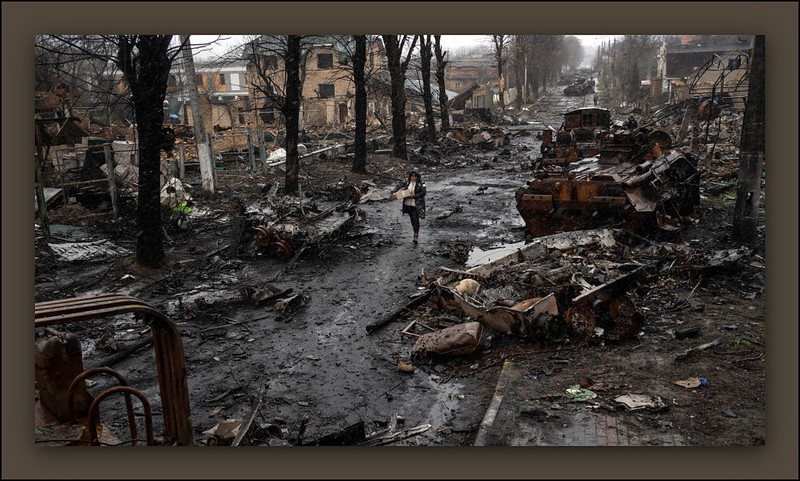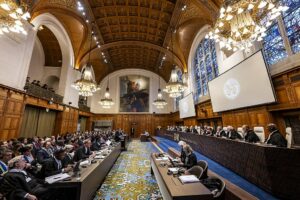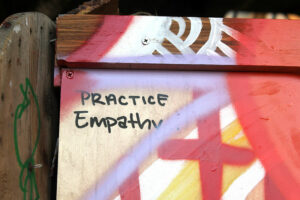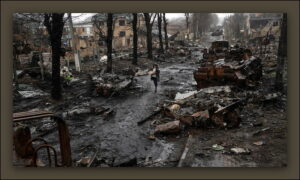SRSG visits Coltan mine in Rubaya in 2014 by MONUSCO Photos/Sylvain Liechti via Flickr (CC BY-SA 2.0)
From food shortages to informants, eight evacuees share their stories with Isobel Koshiw of life in Russian-occupied towns.
It was snowing heavily when Yulia* walked across the only open border between Ukraine and Russia last month, carrying her two cats and dragging a large suitcase behind her.
She had left her village on the edge of Russian-occupied Melitopol, a city in Ukraine’s Zaporizhzhia region, more than 24 hours earlier, paying a Russian ‘carrier’ with a minivan around $250 (nearly £200) to take her to the border-crossing in Ukraine’s northern Sumy region.
Walking across the two-kilometre no-man’s land was the final step in a long journey that is not without risk. Just two weeks earlier, a Russian volunteer who was transporting Ukrainians to the Sumy checkpoint was detained and tortured by Russian security personnel.
It was Yulia’s second attempt at the crossing. The first time, in early autumn, she was turned back at the border because she did not have a Russian passport and her name was flagged in a Russian state database as she had been questioned by the security services twice: once for tearing down Russian propaganda posters and then for arguing with a neighbour about life during the Soviet Union.
This time, having registered for a Russian passport, she finally made it to an area under Ukraine control, where she retrieved a Ukrainian flag she had sewn into the bottom of her rucksack and wrapped it around herself.
Speaking to openDemocracy about her decision to leave the occupied areas, Yulia said: “There were plenty of people in my village who welcomed what happened.” Pensioners would hand authorities information on people like herself, she added.
“It was emotionally difficult. You’re constantly looking through the curtains to see what kind of car is going down the street and cleaning your phone in case it’s checked.”
Yulia added that she had “wanted to leave when [the war] started but I thought at least I can help by giving away Russian positions”. She spent a year sending the locations of Russian troops to a Ukrainian-military run Telegram bot, until the resistance ring was broken up this summer, when the Russians discovered a local ringleader.
No future in occupation
Yulia is one of 33,000 Ukrainians to have re-entered the country from Russia since that country’s military retreated from northern Ukraine in spring last year.
The vast majority cross at the same checkpoint she did in the Sumy region, as Russia and Belarus do not allow crossings at other points, according to Andriy Demchenko, Ukraine’s border force spokesperson.
At that border-crossing in Sumy, openDemocracy spoke with Yulia and seven other people who had travelled from areas occupied by Russia. The places they’d come from are cut off from much of the world; they are not internationally recognised so travel and trade can only be done via Russia – and both have been limited by Western sanctions since 2022.
The eight people’s experiences differed depending on their involvement in political activism and whether their area was first occupied in 2014 or 2022. In the areas of Ukraine that have been occupied since 2014, economic and governance systems have been dire, but they are still somewhat functional compared to in those areas that have been occupied since Russia’s 2022 invasion.
All said they didn’t see a future in the occupied areas, and had chosen to abandon their houses and belongings to try to return to Ukraine. This is commonplace, they said. Millions have gone to Russia to travel on to Europe, from where many will have returned to Ukraine.
Several spoke of people being forced to have Russian passports or to pay the Russian government for local services, as well as of the occupation governments creating networks of informants. All eight said they had regularly communicated with their relatives in Ukraine and that many people in their communities still consumed Ukrainian news media through phones and satellite dishes.
Ukrainian banks have been replaced by Russian ones, according to those we spoke to, which is causing problems because it is not possible to send money to Russian bank accounts from Ukrainian ones. Those in the occupied areas who are out of work or who refuse to accept Russian pensions cannot rely on the easy transfer of money from relatives in Ukrainian-controlled Ukraine. Illegal currency exchangers have sprung up, who take between 10 to 15% of each conversion for themselves.
Those with money can obtain Western goods from seasons past via black-market traders, some returnees told us. But the goods delivered, particularly food, are of a lower quality than people were used to before the 2022 invasion, they said, adding that the price of food and medicine in the recently occupied areas has soared.
Three people openDemocracy spoke with reported that only those who have accepted Russian passports have access to doctors and hospitals. Exceptions are sometimes made for emergency procedures, they said, but in those cases, people without Russian passports are subject to lesser-qualified hospitals, doctors and care.
Most of those we spoke with said they lived a life of relative solitude: not going out in the evenings and being careful what they said and to whom. They all complained about Russian bureaucracy and said there was little to no help if people encountered problems. In the recently occupied areas, complainers or people who did not comply, they said, were threatened with a visit from the Russian security services.
‘My soul was crushed’
Ivan and Ludmilla, aged 60 and 70 respectively, had travelled from a small town near the Luhansk border that has been occupied since 2014.
They told openDemocracy that life was bearable there; businesses and services worked, the Ukrainian language was not oppressed and Ukrainian and Russian songs were still sung at town events.
But political views were not welcomed and the town had been literally downtrodden when it became the main thoroughfare for Russian heavy military equipment.
“I just got my flat renovated and there were cracks in the ceiling like I can’t describe. The roads are completely wrecked,” said Ludmilla, adding that the noise and vibrations from the military equipment were deafening and would go on all day and night.
Ivan said that around 20 to 30% of their town had left – most heading to Russia – but the population exodus was worse in other towns and villages.
He said his “soul was crushed” when he and a friend drove to the area where he grew up this summer and found entire streets had disappeared. “People had left and sold their houses for construction material.”
In the end, both Ivan and Ludmilla decided to leave to reunite with their families in Ukraine. Ivan spoke of having been “really upset” by a graveyard of unidentified Ukrainian soldiers from the 2014-2022 war, marked with numbers, on the outskirts of his town.
“We, as the older generation, find all this very difficult and painful. We grew up when it was all one (country). It’s hard for any of us, still to this day, to understand how this could have happened.”
‘What life can you speak of?’
Another couple openDemocracy spoke with, Daryna and Yuriy, both in their sixties, had travelled to Sumy from a town in the Luhansk region that was occupied in March 2022. Since then, they said, the local economy has crashed, few local services function and daily life has disappeared.
“There are no shops or businesses, just markets for the soldiers who come in from the fields. Everyone trades off them,” said Yuriy, explaining that this is the only work available to young people.
The new authorities, who are often not qualified for their roles, treat residents with disdain, they said. “It’s like anyone can get any position,” said Daryna. “Someone is a cleaner and now they’re the head accountant [for the town].”
Yuriy asked the local administration a question and was told to “fuck off”, while Daryna was made to obtain a Russian passport for her blind, elderly brother so that he would be granted care. Even then, she said, he had to travel to another town as their local hospital had closed.
Daryna said the couple watched Ukrainian TV and tried not to pay communal service charges for several months – not wanting to give money to the new authorities – but they gave in after they were threatened with a visit from the local security services.
“We didn’t go out anywhere. Just sat at home,” said Daryna of the 20 months under occupation, asking: “What life can you speak of?”
*All names and some place names have been changed to protect interviewees who still have relatives living in the occupied territories.
Isobel Koshiw is a freelance journalist.
- This article was originally published on OpenDemocracy in December 2023. See the original article, published under a Creative Commons BY-NC-4.0 license.







